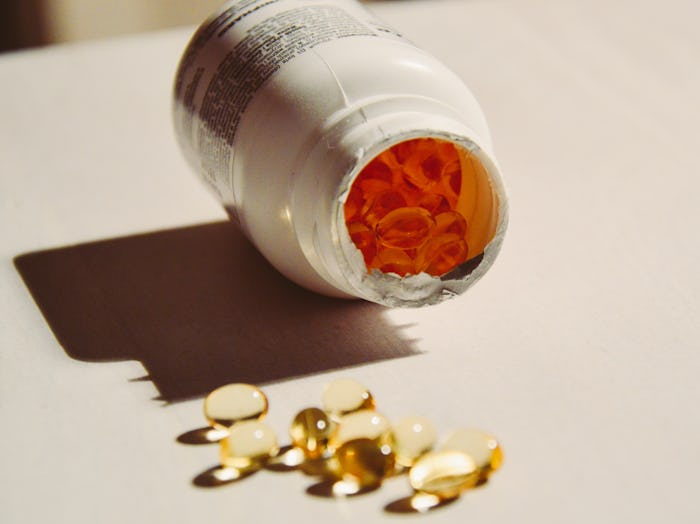Pregnant women are faced with a ton of choices. There are the big decisions that keep you up at night, like whether you should choose an OB or a midwife. There are the smaller choices to consider, too, like what kind of baby swing you should buy. And then comes the decisions that seem pretty easy to make, like what type of prenatal vitamins to take. But what you should look for in prenatal vitamins? You might be tempted to grab any bottle at the drugstore and head to the checkout line — after all, aren't these brands pretty similar to each other? — but not all vitamins are created alike. Because your pregnant body needs certain types of nutrients to thrive, you'll want to make the right choice so your pregnancy is as heathy as possible.
Once you find out that you're expecting, your health provider will recommend that you start taking a daily prenatal vitamin if you haven't done so already. Prenatal vitamins differ from standard adult multivitamins because they contain more folic acid and iron, as noted by the Mayo Clinic. Both of these nutrients are essential for a baby's development by preventing neural tube defects (that's the folic acid) to boosting growth and preventing anemia (that's the iron). This means that you should definitely look for a prenatal vitamin that includes folic acid and iron — the American Congress of Obstetricians and Gynecologists recommended 600 micrograms of folic acid and 27 milligrams of iron daily — and you may need to take additional supplements if your vitamin doesn't provide enough.
Along with folic acid and iron, you should also make sure that your prenatal vitamin contains calcium, vitamin D, and DHA. Calcium and vitamin D are especially important during your third trimester to help strengthen your baby's bones. DHA, on the other hand, is an omega-3 fatty acid that promotes fetal brain and eye development, according to Fit Pregnancy. My own obstetrician, Dr. Neil Foster of Leesburg, Virginia, tells all of his pregnant patients to look for a prenatal vitamin with DHA, preferably at least 200 milligrams daily. That way, you won't need to take an extra DHA supplement along with your regular tablet.
It's easy to feel overwhelmed when you're pregnant, especially since you'll get bombarded with decisions to make. What will you name the baby? Should you find out the sex? What kind of baby swing should you get, and wait, is that $500 stroller worth the splurge? With so much weighing on your mind, you might even stress out over what prenatal vitamin to buy. Fortunately the medical community has set clear guidelines for what to look for in a vitamin, which should streamline your decision-making process — and that'll give you more time to mull over that $500 stroller.
